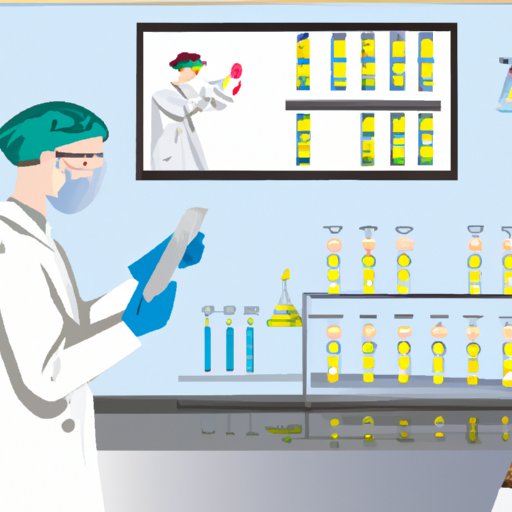Introduction
Lab technicians are essential members of scientific research teams and laboratories. They have a unique skillset that enables them to perform tests and experiments, collect and analyze data, and ensure safety protocols are followed. Becoming a lab technician is a great way to gain hands-on experience in the sciences and make a difference in the field.
In this article, we will explore the requirements for becoming a lab technician, the duties and responsibilities associated with the role, and the strategies for staying organized and efficient. We will also discuss the importance of safety protocols, the equipment and tools needed, and the value of strong communication skills.
Requirements for Becoming a Lab Technician
The first step to becoming a lab technician is to meet the educational requirements. While some employers may be willing to hire those without post-secondary education, having a degree or certification can give you an edge over other candidates. A bachelor’s degree in a science-related field such as biology, chemistry, physics, or engineering is preferred. Additionally, many employers look for applicants who have completed coursework in laboratory techniques, such as microscopy, chromatography, and spectroscopy.
In addition to educational requirements, many employers require their lab technicians to be certified. The American Society for Clinical Pathology (ASCP) offers several different certifications, including Medical Laboratory Technician (MLT), Medical Laboratory Scientist (MLS), and Histotechnician (HT). Each certification requires a certain amount of experience and education, so it is important to research the specific requirements before applying.

Duties of a Lab Technician
The primary duty of a lab technician is to perform tests and experiments in order to collect and analyze data. This data can then be used to draw conclusions and inform decision-making. Lab technicians are also responsible for ensuring safety protocols are followed, and they must be able to work independently and accurately.
For organizations, having a lab technician on staff can save time and money. Lab technicians can provide valuable insight into complex scientific processes, and their expertise can help organizations stay ahead of the competition. Additionally, lab technicians can assist in developing new products and technologies.
Safety Protocols and Procedures
Safety protocols and procedures are essential in any laboratory environment. Lab technicians must be aware of the potential hazards and take the necessary precautions. This includes wearing the appropriate protective gear, following safety instructions, and properly disposing of hazardous materials. Lab technicians should also keep up to date on any changes to safety regulations and policies.
Equipment and Tools Needed
Lab technicians need to be familiar with the various pieces of equipment and tools required to perform tests and experiments. This includes microscopes, pipettes, thermometers, centrifuges, and other pieces of lab equipment. Lab technicians must also be able to use computers and other technology to record and analyze data.

Accurate Data Collection and Analysis
Accurate data collection and analysis is critical for any lab technician. This requires attention to detail and an understanding of the scientific process. Lab technicians must be able to interpret results correctly and identify potential errors. They must also be able to explain their findings in a clear and concise manner.
Communication Skills
Strong communication skills are essential for lab technicians. They must be able to effectively communicate with scientists, engineers, and other professionals in the laboratory. They must also be able to present their findings to management and explain the implications of the results.

Strategies for Staying Organized and Efficient
Organization and efficiency are key qualities for any lab technician. To stay organized, lab technicians should make sure all data is properly recorded and stored. They should also create systems for tracking experiments and results. Efficiency can be improved by creating timetables and scheduling tasks accordingly. Additionally, lab technicians should strive to streamline processes and reduce waste.
Conclusion
Being a lab technician is an exciting and rewarding career path for those interested in the sciences. It requires dedication and hard work, but the rewards are worth it. To become a successful lab technician, one must meet the educational requirements, understand safety protocols and procedures, possess the necessary equipment and tools, maintain accurate data collection and analysis, and develop strong communication skills. With the right strategies for staying organized and efficient, lab technicians can make a lasting impact in the field.
(Note: Is this article not meeting your expectations? Do you have knowledge or insights to share? Unlock new opportunities and expand your reach by joining our authors team. Click Registration to join us and share your expertise with our readers.)
